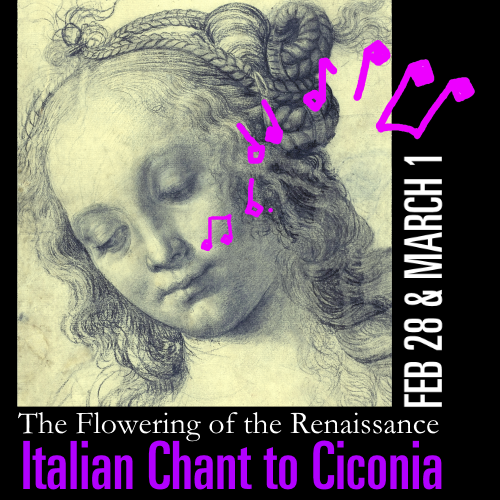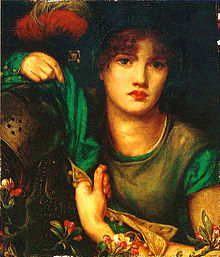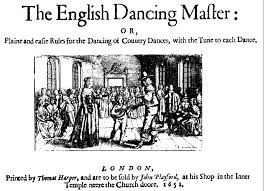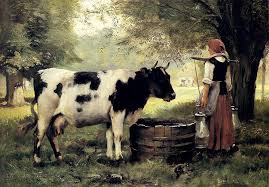And Now for Something Completely Different!
Danny Johnson
HEY! February is a short month, so let's do a Baroque concert and then in 3 weeks give a Medieval / Renaissance concert! "C'mon," they said; "it'll be fun," they said.
Darned if they weren't right. I love this stuff! You're going to, too!
More soon!
Danny
The Flowering of the Renaissance:
From Italian Chant to Ciconia
Saturday, February 28, 2015 at 8PM
St. Mary Cathedral, 203 East 10th St., Austin, TX
(Free parking is available in the Capitol Towers Parking Garage located off San Jacinto Blvd.,
immediately behind St. Mary Cathedral. The gates will be lifted after the concert
so one can depart without paying between 9:45-10:15)
&
Sunday, March 1, 2015 at 3PM
First Presbyterian Church, 8001 Mesa Drive, Austin, TX
Single tickets can be purchased by clicking on the button below
and are also available at the door, payable with cash, check, or credit card:
$30 general, $25 senior (age 60+).
Discount prices for students with student ID are available
for purchase at the concert door for $5.
One of the most magical and transformative periods in all of Western music history emerged in Italy in the 14th and 15th centuries, full of stylistic and theoretical developments that led to the golden period we call the Renaissance. Music from the ars nova period (the 14th century, called the trecento) displayed variety and expressiveness in ways not previously possible. Florentine composers such as Lorenzo da Firenze, Gherardello da Firenze, and Francesco Landini created music that was wildly exciting with incredible rhythmic variation and chromaticism and yet there was much that was incredibly delicate and tuneful. Some of the pieces that will be performed by these three composers include Lorenzo’s “Io son un pellegrin,” Gherardello’s exuberant canon for two tenors, “Tosto che l’alba,” and Landini’s “Abbonda di virtù.”
The Flemish composer Johannes Ciconia, whose professional career as a composer and theoretician was spent almost entirely in the papal chapels and in Padua, represents the next generation of composers in our program. His music is a blend of French and Italian techniques and the result is a style that is uniquely his. The aural effects created by Ciconia’s style of imitation are vibrant and absolutely refreshing! His works “Venecie, mundi splendor,” “Ut te per omnes celitus,” and others will display his jaw-dropping creativity and inventiveness.
Ciconia’s work in Italy in the early part of the 15th century paved the way for other Lowlands composers such as Heinrich Isaac and Josquin des Prez, both of whom spent major portions of their careers in Italy and helped make Italy the flower of the Renaissance. Isaac’s long-term working relationship with Lorenzo de' Medici established him as the preeminent Florentine composer at the end of the 15th century; his motet “Quis dabit capiti meo aquam,” written to commemorate Lorenzo’s death in 1492, is a truly touching testimonial to his patron. Isaac’s motet from the Song of Songs, “Tota pulchra es,” is among the most beautiful and spellbinding works from the Renaissance.
Peter Maund, Bay-area specialist in early percussion, returns for the concert, as will Mary Springfels, renowned virtuoso on Medieval fiddle and viola da gamba. Erin Calata, mezzo-soprano from Seattle, will be the featured soloist in Isaac’s ode to Lorenzo de’ Medici, and will be will be joining TEMP soloists Cayla Cardiff, Jenifer Thyssen, Stephanie Prewitt, Jeffrey Jones-Ragona, Paul D’Arcy, and Daniel Johnson. The complete complement of performers includes sixteen singers and seven instrumentalists (vielles, violas da gamba, recorder, harp, and percussion) for a concert that will be in turns sweetly meditative and rousingly lively, both in the visually and acoustically magnificent space of St. Mary Cathedral and in the much more intimate (and acoustically renovated) First Presbyterian Church.
Join us for wild and saucy dances fit for Boccaccio's Decameron, shimmering and bold works by Ciconia, and progressive and iconic motets by Isaac. Experience the expressive beauty of the Renaissance blooming across Italy.


















